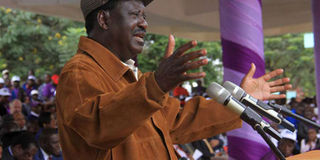Another referendum won’t be cure for all that ails country

ODM leader Raila Odinga addresses a gathering at Uhuru Park, Nairobi, on May 1, 2018 during Labour Day. He wants the governance structure to change. PHOTO | JEFF ANGOTE | NATION MEDIA GROUP
What you need to know:
- The winner-take-all nature of our presidential elections has contributed a great deal to the turmoil that engulfs our nation every election cycle.
- As for the proposal to create a third tier of devolved government that, in my books, does not even come close to making any sense.
As far as I am concerned, there should be only two reasons for Kenyans to be subjected to yet another referendum barely months after two presidential elections which brought out the worst instincts in our collective psyche.
The first is that Kenyans must find a way to curb the greed of our elected representatives, and the second is to reduce their numbers drastically.
Anything else can be easily handled through legislation, and through laws that already exist.
Many people are gradually beginning to realise that the call for a referendum to decide on many nebulous issues is just another attempt at a second repeat election.
Should that be the real motive for the much-heralded handshake, then the proposed referendum is going to be a very costly affair for Kenya.
MERIT
Indeed, for all practical purposes, we have already gone back to the hustings a mere five months after a very turbulent year.
The questions we should ask ourselves are: Do we really need a referendum to cure all the ills afflicting our body-politik?
Do we need a national vote to decide how to fight corruption?
Can a national ethos be inculcated through a plebiscite? Can we cure negative ethnicity through a referendum?
And what of guaranteeing “shared prosperity” – can it come about without us changing our entire politico-economic system through a bloody revolution?
No, there are only two issues that really require a referendum as so eloquently articulated by opposition leader Raila Odinga.
GOVERNMENT
The first is to reform the structure of government, which essentially means switching from a presidential system to a parliamentary one.
The main reason this proposal has evoked strong opposition from a number of people from one wing of the ruling party is that its main aim seems to be to weaken the presidency and vest all power in an executive prime minister.
I can never seem to understand what, in practical terms, this means unless we are engaging in a game of semantics.
Logically, if you create the office of a powerful executive prime minister, anybody with any sense will be gunning for it and not for a lame presidency.
After all, people seek political positions to win and wield power regardless of the title bestowed on the office.
CONSTITUTION
If we go the executive prime minister route, what difference will it make except that the person who heads a party that wins the majority of parliamentary seats will be picked by fewer than 300 individuals to form a government, instead of millions of Kenyan voters doing it under universal suffrage?
I would understand a situation in which a president elected by the people cedes some powers to a non-executive prime minister – it is the norm in the rest of East Africa – but this other thing is really baffling.
There is no question that the Constitution is due for reforms without necessarily changing its essence and, if that must come about through a referendum, so be it.
Also, there is no countering the fact that the winner-take-all nature of our presidential elections has contributed a great deal to the turmoil that engulfs our nation every election cycle.
POLITICIANS
However, my contention is that it is not the system at fault but our national obsession with politics and the cluelessness of the main players in the game.
As for the proposal to create a third tier of devolved government that, in my books, does not even come close to making any sense.
In a situation where we have too many MPs, too many counties, too many MCAs, and too many governors with an equal number of senators allegedly watching over them, adding yet another layer of eating chiefs will never make for better governance.
***
Nothing demonstrates the rate at which we have been disoriented by our growing addiction to digital technology than this episode.
A fellow saw on Page 1 of a daily newspaper a small photograph of the expensive guzzlers belonging to the country’s governors during the Devolution Conference.
Annoyed by the unabashed show of opulence, the chap tried to enlarge the picture using his thumb and second finger the way he does with those in his cell phone, but of course the picture wouldn’t cooperate.
I know the story to be true, for I was the culprit.
As a result, I became the butt of jokes from those who had gazed at me in wonder.





